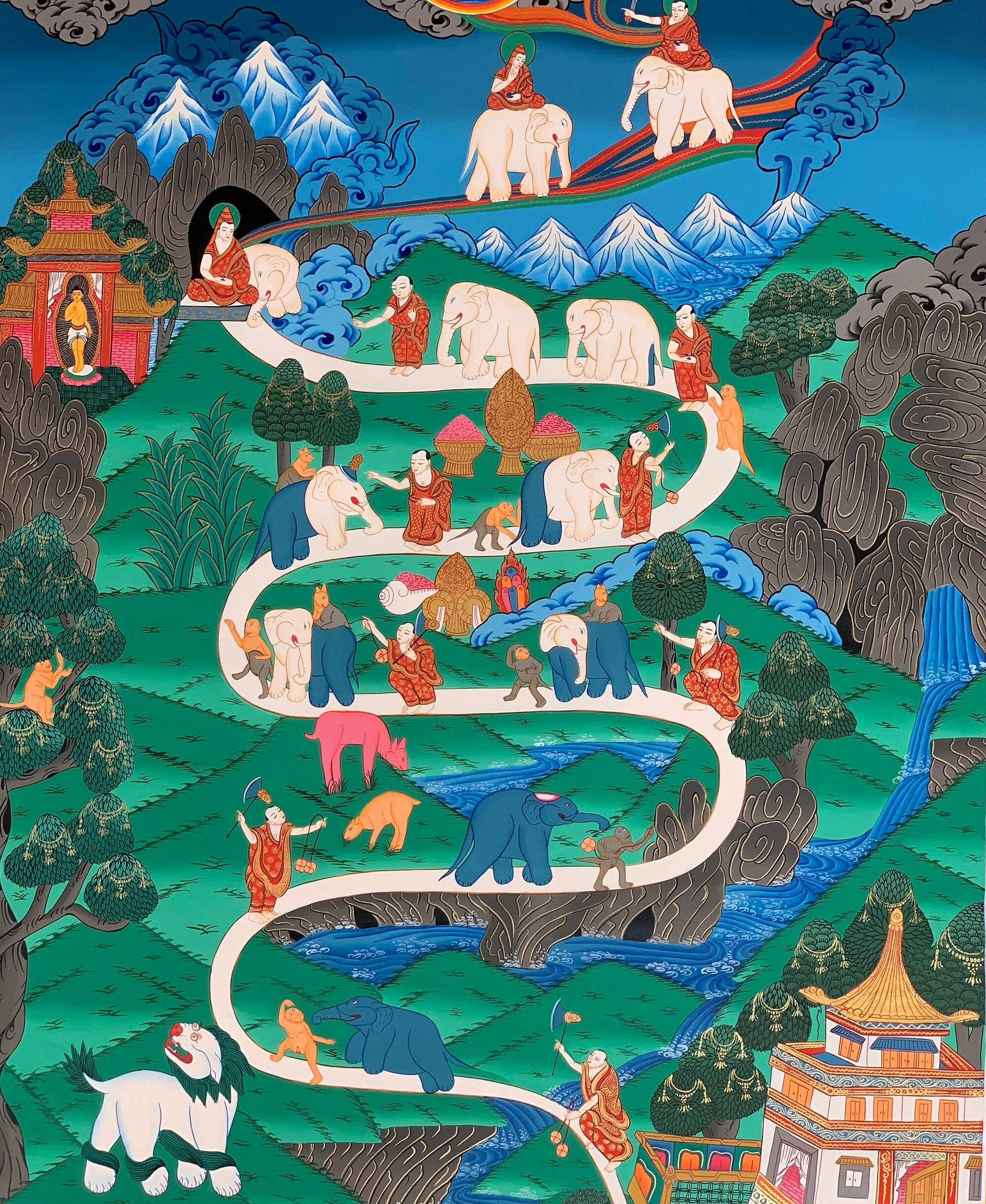Welcome home! Please contact lincoln@icrontic.com if you have any difficulty logging in or using the site. New registrations must be manually approved which may take several days. Can't log in? Try clearing your browser's cookies.
Stages of Samatha
I love Thankas. This is a copy of a well-known depiction of the stages of Samatha.

In this painting at bottom the meditator begins with the mind (elephant) leading the meditator which is in turn led by a monkey (as in monkey mind). As time goes on the elephant is tamed, and is led by the meditator, and the monkey goes away. Finally, Enlightenment, followed by Buddhahood, is achieved and the meditator rides the mind. For more:
https://enlightenmentthangka.com/blogs/thangka/nine-stages-of-samatha-meditation
5






Comments
Also interesting how the elephant changes colour, and how the monkeys go from leading the elephant to being left behind.
Yes. Check this out:
https://enlightenmentthangka.com/blogs/thangka/nine-stages-of-samatha-meditation
I was taught that Samatha is a complete practice and is illustrated in the Thanka. There is no other practice needed to achieve both Enlightenment and Buddhahood. You can certainly practice Meta, Tonglen, Mahamudra, Dzogchen and others, but according to the teaching I received, Samatha is all you really need. This is why I practice Samatha, almost to the exclusion of other practices.
I liked shamatha as a practice, I got on well with it during the period I did it. Whether it is a complete practice or not I cannot say, at a certain point I just got the indication to stop from within, and I tend to follow those.
I don't know for sure if the medications my doctor prescribes will work as advertised. Some appear not to, but blood tests, taken months later offer some indication, but again, can I trust those tests? I take them anyway, because I trust the doctor that prescribed them, despite any evidence to support it. The operative, here, is trust.
The same goes to my teachers and the practice lineage. I trust them. What I get, from within, isn't particularly trustworthy. It's the elephant led by a monkey and ridden by a rabbit, with me chasing after. This metaphor is handed down via my practice lineage. I trust that. There's no reason not to.
People use different forms of practice for different reasons and goals. My goals and reasons are largely the same as anyone in the Mahayana and Vajra traditions: Enlightenment and Buddhahood. I don't concern myself, too much, with what others do and why, but there are times when I can't help but wonder.
And here I thought that just about every Buddhist school taught that they were the surest route to Enlightenment & Buddhahood.
I wouldn't know. Like I said, Samatha is taught as a complete practice. That doesn't mean it's the only practice. There are many lineages that have produced enlightened being, not just the one I affiliate with.
That lineage offers other practices in addition to Samatha - Tonglen, Mahamudra, Ngondro, various yogas. It all begins with Samatha. My guru, holding a Nyingma lineage along with Kagyu, teaches Dzogchen, as well. I've looked into all of them, and decided some years ago to stick to the basics of the lineage. Samatha.
There has been this idea in psychology introduced in the past several years analogizing our brain as an elephant and its rider (I wonder if it was influenced by this teaching). That our rational minds are like the rider and our emotional minds are like the elephant, similar to Kahneman and Tversky's system one and system two thinking. The elephant is much stronger and generally takes the lead. The rider can nudge it a bit this way and that. Some would say that the elephant takes the main role and the rider mostly just justifies post hoc why the rider decided to do that action.
Anyway, it always reminded my of the samatha mind training and that with the right effort the elephant can be brought under a greater degree of control by the rider perhaps.
https://www.creativehuddle.co.uk/post/the-elephant-and-the-rider
More than that. The Thanka demonstrates that a complete level of control can be achieved.
Absolutely, I think my comment wasn't really clear. There is a big similarity between the psychological thinking here and the traditional mind training metaphor, I can't say if they're 100% the same thing though. And realistically for the vast majority of people greater control is what's achievable rather than complete control.
I should be clear. I don't care about "psychological thinking" here. Not in the least.
Samatha isn't about psychology.
In the near term, perhaps. In the long term, and that can extend to future birth, achievement extends.
Hmm, “complete level of control”, I think that is largely illusory? I don’t really believe in complete control of body or mind, I think that is a shadow that one can choose to chase.
Fair, I was talking about a comparison between modern psychology and the traditional Buddhist samatha stages. Maybe there is something they can learn about taming the elephant?
That means you don't believe in a Buddha, right? Just kidding on that, but think about it.
Well, look t the OP. The mind, being the source of the illusions you speak of, being chased, by someone. Like you, perhaps.
And as long as you "believe" that a thing can't be done, for you, it never will. At least not in this lifetime.
Fair enough, let’s examine the sources of control and of action. For example, do you ever “choose” to close one eye against the sun’s glare on a floor or a window? I never choose to do this, but I find that I’ve done it automatically quite often.
Or the thoughts that arise in the mind, do you control those? Do you find that you are aware of the entire lifecycle of thoughts — what triggers them to arise, what makes them evolve, at what point they disappear and return? Do you have control over those things? Would you want to?
Or an itch? Do you find yourself subconsciously scratching a spot on the side of your head because there was an itch, or are you fully aware of all itches at all times? Would that not get very annoying?
Or while driving? Would you want to be fully aware of all aspects of driving all the time? For a lot of people this is automatic to the point that they are thinking of other things and only become aware at the point where they have reached their home.
It seems to me there are a lot of areas of our functioning where part of what “we” do is automatic. Even more, some people’s explanations of anatta are such that there is really no such person, that things just are as they are without there ever being anyone who is in control, indeed there ever being anyone at all.
There was recently a study where people were examined by means of their brain waves to see what happened when they decided to take an action. And they found that brain waves signalling that there was going to be an action were visible ten seconds before any such idea was presented to the subject. Reality is a mysterious thing indeed.
There is always choice, even on a subconscious level. It's karma. Habitual patterns of thought and action and, like any habit, they can be broken. To do so is a matter of time and effort.
And please, I started this thread to be about Samatha, not psychology. We're veering off-topic. It seems that you think the aims of Samatha are largely impossible. That's fine. Believe whatever you like and move on.
In fact, you haven't actually discussed the stages of Samatha at all.
Ok, then let’s talk about the Thanka. My understanding of shamatha is that it’s relatively straightforward as far as the instructions are concerned, just breathing and concentrating on the breath in the nostrils. So to me it seems like these pictures of the Thanka must relate to an internal process.
So what should one pay attention to in the pictures? The elephant and the monkeys slowly change colour and position relative to the monk, but how the movement of the monk’s tools indicate what one should do is not clear to me.
At first there seems to be some distance between the running elephant and the monk, and the monkey also seems to have some kind of taming tool. Then later on there are two monkeys, one sitting on the elephant and one in front. Then the elephant has a hat, and one monkey disappears…
Cool!
There's more to it than that, and the breath is just one of several different kinds of meditation objects that can be employed.
Concentration isn't what you do. You rest on the object. Not the same thing. Concentration implies force on some level, and this isn't something you should force. The instruction is to rest naturally. This is harder to do than it seems. You are, in effect, observing the breath, and in so doing, natural breathing is disrupted, and the breath becomes forced. Or contrived, if you like. One of the earliest lessons to learn is to be able to rest with the breath in its natural state. I've been doing Samatha for 20 years, and only in the last few years have I been able to breathe naturally in meditation.
That gets tricky. If Samatha is mind training, and the mind is internal, then there's an internal process. However, using vipassana, you can't find mind internally. Finding it elsewhere is equally difficult, so where is it?
Whatever you like in any moment. The picture illustrates the 9 stages of Shamatha. Familiarity with those is helpful. I provided a link. Did you follow it and read the material?
Clarity comes with practice.
I did, yes… but I don’t think shamatha is the practice for me at the moment. I’m a ways into my own path, I will let this be for now. Good luck to you and your appreciation of the Thangka.
My concentration is pretty shit, and samatha isn't really my practice. I have seen change in the level of control of my mind over the years though and on the occasions that I do get concentrated I can understand that this is a skill that could be further developed. If memory serves, the test if someone is at the final stage is that they could hold an uninterrupted state of concentration for 4 hours? I can imagine that to be possible for someone devoting their life to that goal.
@IdleChater Whenever I have tried to convince others of something it was usually because I myself was not 100% convinced. I thought, subconsciously, that if everyone thought the same as me, I'd be let off the hook of uncertainty. No need to convince anyone. Pursue samatha 100%. See what happens. Just my 2cc, could be way off the mark.
I certainly admire your persistence @IdleChater … 20 years of one practice is not something I have been able to manage, I get thoughts of progress and then I tend to evaluate and change direction every few years at least.
And the thought of samatha as a complete practice is interesting too.
I like shamatha. Or at least my interpretation of it. For me it's a useful tool to arrive calmly at the 'here and now'. And from there, one can observe lots of details, the consistency of their mind and feelings, the causes of urges, results of doings; Becoming responsive rather than reactionary. Maybe from another perspective, it brings the inner sangha together to collaborate on one activity rather than the numerous different projects and attractions regularly dividing the attention within a body and mind.
One of my bigger problems is I can't help but direct it outwardly. It turns watching a show or the news into an observation of the actors themselves, not solely the character they're playing or information they're attempting to convey, but the stuff they aren't. Then I get lost in that and distracted. Maybe particularly challenging when observing people directly involved in MY life such as having a boss who has his boss character, role, and duties but also feels ways about you personally which reveal in subtle remarks and expressions. Which elephant is that and how to move on from it?
And that's a trap. Contemplating progress in your practice is a huge distraction. It's akin to watching grass grow, but slower. Do the practice for the sake of the practice. Make the practice a goal in and of itself. Samadhi doesn't happen overnight. The path illustrated in the Thanka, represents a lifetime, or more, of practice. So don't think of progress.
Interesting? How so?
Just pursue Samatha. That's it.
I like this mindset. I think the technical differentiation is process orientation vs goal oriented.
But then again,
“Insanity is doing the same thing over and over again and expecting a different result.”
— Albert Einstein
Evaluating one’s progress is not a bad thing to do. I’m generally not in favour of spiritual practices which tell one just to keep repeating something for ever.
I'm not sure how that applies.....
If you insist on looking at this in terms of good/bad, then I have to say it's neither good nor bad. Nothing bad, will result, yes, but nothing good can result, either.
It's not "forever". Enlightenment allows you to leave that raft behind
Well, my experience of samatha was that it was restful for short periods but not an agent of change within. I did it for about a year, which at the time I thought was really quite long But then, I’ve never set out to be a monastic or a lifelong practitioner.
But then, I’ve never set out to be a monastic or a lifelong practitioner.
What were you expecting to change? I assume it was something of an improvement. That isn't what Samatha is for.
Same here. It's been 20 years, though, and I'm still at it. Who knows what the next 20 will bring? I sure don't, and it doesn't really matter. Maybe that's why I continue.
@Jeroen said:
Well, my experience of samatha was that it was restful for short periods but not an agent of change within.
I have sat formally in Serene Reflection Meditation, at least twice a day, for the last 50 years.
In that time period I have met a wide range of practitioners from those who have stuck to just one meditative form, to those who have tried a plethora of alternative forms.
What they almost all seem to eventually discover, is that the true obstacles to their spiritual journeys turned out to really be about themselves, not the forms of practice that they were involved with.
Whatever fosters
compassion, love and wisdom
from what otherwise might be be
greed, hatred and delusion
is enough.
Only the ego, the selfish self or an identity's storyline, says there should be something more.
I guess the ox herding teachings might be Chan's equivalent descriptions of your elephant/rabbit & monkey progressions along the path toward suffering's cessation.
https://terebess.hu/english/oxherd5.html is one description of them.